Use of the death penalty is on the decline globally, with the majority of sentences handed down and carried out by a handful of hardcore holdout countries, Amnesty International said in a report (.pdf) released Tuesday. According to the report, “Death Sentences and Executions 2009,” countries that carried out the most sentences include China, Iran, Iraq, Saudi Arabia and the United States. In some places like China and Sudan, executions are applied extensively as a means to intimidate government opponents. China remains the world leader in carrying out death penalty sentences, executing more individuals that the rest of the world […]
China Archive
Free Newsletter
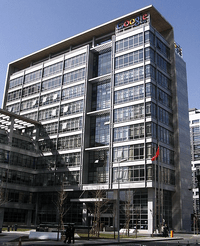
The dust has far from settled following Google’s decision last week to stop censoring its Google.cn search portal and shift all its Chinese search traffic to its Hong Kong operation, Google.com.hk. But already, the company’s latest move has been portrayed as everything from naïve and idealistic to economically foolhardy. Nevertheless, the decision is clearly a bold one, and by using a potentially enormous fissure in the politics of contemporary China to take a stand on the question of information openness, it may also prove to be shrewd. At the very least, Google is playing at a much deeper political game […]
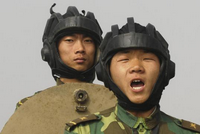
NEW DELHI — Recently, both China and India increased their official defense budgets for fiscal year 2010, to $78 billion and $32 billion, respectively (although according to Western observers, China’s actual military spending is up to three times the official figures). In doing so, Beijing raised its defense allocation by 7.5 percent, and New Delhi by just under 4 percent. Besides the differences in absolute budget and percentage growth, the two countries also demonstrate contrasting approaches to achieving their overall military objectives. For China, defense spending is a means toward achieving long-term power ambitions and military supremacy, while India is […]
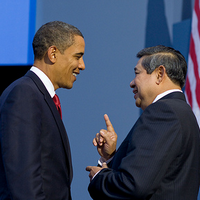
JAKARTA, Indonesia — Before U.S. President Barack Obama’s scheduled visit to Indonesia this week was postponed, expectations in both Washington and Jakarta were running at a fever pitch, especially in anticipation of the possible signing of a “Comprehensive Partnership” between the two countries. On one side, Washington is eager to strengthen relations with Southeast Asia’s largest democracy in the face of growing Chinese influence. The fact that Indonesia is home to the world’s largest Muslim population also plays into the Obama administration’s efforts to further reach out to the Muslim world and improve its global standing. Finally, Indonesia’s geostrategic location […]
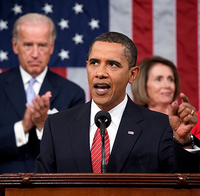
Some foreign policy analysts believe that President Barack Obama’s legislative victory on health care reform this week will have a positive impact on his ability to make progress in the foreign policy realm as well. Clearly, Obama’s credibility in the eyes of foreign governments would have been severely — perhaps even irreparably — damaged had he failed to pass the flagship legislation of his domestic agenda, despite overwhelming Democratic majorities in both houses of Congress. But the White House is not out of the woods just yet. For the president to build on the momentum he gained from the health […]
Writing at East Asia Forum, Tokyo University’s Takatoshi Ito argues that China’s housing bubble is worse than what’s being let on and that the measures Chinese authorities are taking will not be adequate for a soft landing. In particular, he traces China’s resistance to allowing the yuan to appreciate to a misreading by Chinese authorities of Japan’s “lost decade”: Many Chinese officials tell us that they believe the origin of Japan’s stagnation for the 20 years after its [1980s] housing bubble burst lies in its failure to stand up to US pressure for the yen to appreciate . . . […]
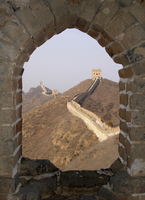
This past Monday, China’s highest governmental legislative body, the National People’s Congress (NPC), wrapped up its annual meetings in Beijing. While these meetings are mostly considered to be rubber-stamp assemblies, they can reveal something of the Chinese Communist Party leadership’s policy priorities, as well as some of the various interest groups within the party. And as the statements and declarations emerging from this year’s meetings make clear, the party leadership has identified consolidating the institutional move toward “inner-party democracy” as the key to curbing corruption and preventing concentration of power at the local levels of government. This “democratic centralism” takes […]
The U.S. and EU are bitterly divided over hedge fund regulations that the U.S. calls protectionist. (It turns out the EU is bitterly divided over the regulations, too, but let’s set that aside for now, in order to facilitate my argument.) Meanwhile, the EU is bitterly protesting the U.S. Air Force tanker contract debacle, which it says illustrates U.S. hypocrisy on said protectionism. And all this is taking place in the context of longstanding EU complaints that the U.S. has deliberately allowed the dollar to slide, to the detriment of euro-zone exporters. (Again, let’s set aside the euro’s recent tumble […]
Worldfocus’ Daljit Dhaliwal interviews Michael Kulma of the Asia Society on China’s stance toward the West. After some tough talk by Premier Wen Jiabao at the annual meeting of China’s parliament, some have speculated that Beijing’s stance is once again hardening toward the West. Kulma argues that relations with the West, particularly the United States, have always moved in a cyclical pattern and perhaps now may just be a low point in relations that will inevitably improve.
China’s Southeast Asian neighbors are engaging in a sustained military buildup, with their imports of major conventional weapons systems almost doubling in volume in the five-year period from 2005 to 2009, compared to the 2000-2004 period. Although some of these imports may have replaced obsolete weapons or matched purchases by other Southeast Asian countries, China’s massive military buildup is an important factor driving the region’s defense modernization efforts. According to the latest data released by the Stockholm International Peace Research Institute (SIPRI), imports of major conventional arms by Indonesia rose by 84 percent in the two five-year periods. For Singapore, […]
The National People’s Congress serves as a platform for the nation’s leaders to come together to reaffirm the national agenda and to more informally lobby for provincial interests. The event is heavily covered by the international media as well as politicians looking to take the pulse of Beijing. Al Jazeera’s Melissa Chan reports from Beijing.
I just got through reading a few unrelated blog posts that combine to make for an interesting discussion of the U.S. response to shifting regional dynamics in Asia and the Middle East. Hugh White sketches how he thinks the U.S. should adapt its Asia strategy to accomodate China’s rise, while Tobias Harris exposes the limitations of the “losing Japan” narrative. Meanwhile, Elias Muhanna argues that the U.S. narrative of a moderate vs. militant divide in the Middle East fails to take into account how the landscape has shifted there, quoting this from a Washington Post op-ed by Rob Malley and […]
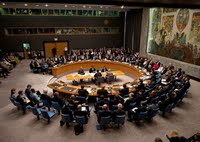
One of the strengths of the Naval War College is that it constantly reviews and assesses its curriculum. In support of that effort, I have been reacquainting myself with E. H. Carr’s seminal work “The Twenty Years’ Crisis,” which got me to thinking: Will we look back on the period of time between 1991 and 2011 as another two-decade interregnum marked by crisis and opportunity? This isn’t an entirely original thought. James Goldgeier and Derek Chollet opened this discussion two years ago when they published, “America Between the Wars: From 11/9 to 9/11.” But I wanted to focus on the […]
Women’s rights advocates, governments, NGOs and women around the world marked International Women’s Day yesterday, with cheers for progress achieved and calls for even more global efforts to ensure protection for the rights of women and girls. “Most girls now receive an education, particularly at primary level, and more women are now more likely to run businesses or participate in government. A growing number of countries have legislation that supports sexual and reproductive health and promotes gender equality,” United Nations Secretary-General Ban Ki-moon said in his International Women’s Day 2010 message. “Nonetheless, much work remains. Maternal mortality remains unacceptably high, […]
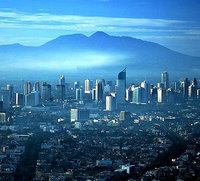
China has designated 2010 “The Year of China-Indonesia Friendship” to mark the 60th anniversary of establishing diplomatic relations with the world’s fourth-largest country. But while both countries are poised to reap major benefits from their improved bilateral ties, Beijing and Jakarta must manage their asymmetric relationship skillfully to mitigate potential tensions in the future. Relations between China and Indonesia have certainly come a long way since the height of the Cold War. Beijing, then reviled by Jakarta as a fomenter of communist insurrection, is now welcomed as a key investor in Indonesia’s economic future. Bilateral trade has mushroomed by an […]
As the push for a new round of sanctions against Iran falters, it’s becoming increasingly apparent that the Obama administration’s game plan on Iran policy was long on tactics and short on strategy. We’ve heard a bit about how U.N sanctions are up against a “bad UNSC,” which currently includes Brazil, Turkey and Lebanon as non-permanent members. But that should come as no surprise, and the same goes for those three countries’ predictable resistance to getting vocally on board for stiff sanctions. Now comes word that the administration is trying to carve out an exemption for China in unilateral U.S. […]
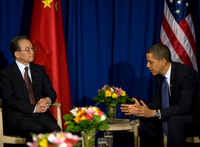
Last week, senior students at the Naval War College presented their Final Exercise briefs. In assessing how the world of 2030 will take shape, many drew on the National Intelligence Council’s report, “Global Trends 2025: A World Transformed,” particularly its assessment — as a “relative certainty” — that “a global multipolar system is emerging with the rise of China, India, and others.” This is the future everyone expects, but in order to determine what steps the United States should take now, in 2010, to mold and nudge how this future will unfold, we need to answer a fundamental question: What […]
